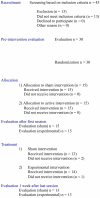Visceral Mobilization and Functional Constipation in Stroke Survivors: A Randomized, Controlled, Double-Blind, Clinical Trial
- PMID: 32537276
- PMCID: PMC7286593
- DOI: 10.7759/cureus.8058
Visceral Mobilization and Functional Constipation in Stroke Survivors: A Randomized, Controlled, Double-Blind, Clinical Trial
Abstract
Introduction Chronic functional constipation is common among stroke survivors. Osteopathy is an effective form of treatment as it acts on the structures surrounding the bowels that may have lost their normal capacity of resilience. The aim of the present study was to evaluate the effect of visceral mobilization on symptoms of functional constipation and static balance in stroke survivors. Materials and methods Thirty stroke survivors met the eligibility criteria and were randomly allocated to a group physical therapy and visceral manipulation or a group physical therapy. Both groups were submitted to conventional physical therapy. The group physical therapy and visceral manipulation was also submitted to visceral mobilization (sphincter inhibition and mobilization of the large intestine), whereas the group physical therapy was submitted to a sham procedure (superficial touching over the intestines). Evaluations were conducted prior to the intervention, immediately after the first intervention session and one week after the end of the five sessions. At each evaluation, the static balance was analyzed using a computerized plantar pressure sensor. Moreover, an intestinal symptoms rating scale was administered during the pre-intervention evaluation, and one week after the end of the intervention. Results Significant improvements were found in intestinal symptoms (frequency of bowel movements, abdominal pain/discomfort, difficulty eliminating stools, sensation of intestinal swelling or distention, difficulty eliminating gas, sensation of incomplete bowel movement and, anal pain during bowel movement) and static balance (anteroposterior sway: F = 82.06, p = 0.0001; velocity of anteroposterior sway: F = 17.6, p = 0.001; and velocity of mediolateral sway: F = 4.41, p = 0.01). Conclusion Visceral mobilization can be part of a neurologic rehabilitation program to improve symptoms of constipation and static balance in stroke survivors.
Keywords: balance; functional constipation; osteopathic manipulative treatment; stroke; visceral mobilization.
Copyright © 2020, Pasin Neto et al.
Conflict of interest statement
The authors have declared that no competing interests exist.
Figures
References
-
- Frequency of functional constipation in 3 different populations and its causative factors. Khatri PK, Ali AD, Alzadjali N, Baghia G, Khaliqdina SJ, Aziz S. http://jpma.org.pk/full_article-text.php?article_id=3127. J Pak Med Assoc. 2011;61:1149–1152. - PubMed
-
- Functional bowel disorders. Longstreth GF, Thompson WG, Chey WD, Houghton LA, Mearin F, Spiller RC. Gastroenterology. 2006;130:1480–1491. - PubMed
-
- Prevalence of self-reported constipation in adults from the general population [Article in English, Portuguese] Schmidt FMQ, Santos VLCG, Domansky RC, Barros E, Bandeira MA, Tenório MAM, Jorge JMN. Rev Esc Enferm USP. 2015;19:440–449. - PubMed
-
- A systematic review of the effectiveness of bowel management strategies for constipation in adults with stroke. Lim SF, Childs C. Int J Nurs Stud. 2013;50:1004–1010. - PubMed
LinkOut - more resources
Full Text Sources
Miscellaneous


